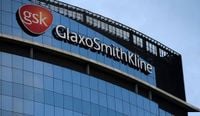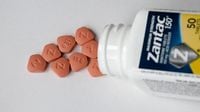British pharmaceutical giant GSK is facing serious allegations in a new lawsuit claiming the company buried evidence linking its heartburn medication Zantac to cancer. The lawsuit, filed by the Roofers Local No149 Pension Fund in the US District Court in Pennsylvania, accuses GSK and three of its executives, including CEO Emma Walmsley, of misleading investors by denying any knowledge of a connection between Zantac and cancer.
Zantac, which was launched in the UK in 1981, quickly became a best-seller, achieving the status of the world’s fastest-selling drug by 1988. However, the medication was withdrawn from the market in both the UK and the US in 2019 due to concerns that its active ingredient, ranitidine, could form a carcinogenic chemical when combined with nitrates, commonly found in various foods. This withdrawal led to tens of thousands of people in the US seeking compensation for potential harm caused by the drug.
In October 2020, GSK reported that it had spent a staggering $2.2 billion settling 93% of the legal cases related to Zantac without admitting liability. Despite this, the recent lawsuit claims that GSK was aware of a link between Zantac and cancer for nearly 40 years before the drug was ultimately pulled from the shelves.
According to court documents, a scientist named Richard Tanner, who worked for Glaxo, a predecessor of GSK, discovered in 1982 that when ranitidine interacted with nitrites, it produced around 232,000 nanograms of N-nitrosodimethylamine (NDMA), a known carcinogen. This finding raises serious questions, especially since the US drug regulator has established that only up to 96 nanograms of NDMA is considered acceptable in any medication.
The pension fund's lawsuit alleges that GSK and its predecessor company Glaxo intentionally concealed this critical report, leading to significant economic losses for investors when the truth about Zantac's risks came to light. GSK has responded to the lawsuit, stating, "We’re reviewing this legal proceeding." The company has maintained that the scientific consensus indicates there is "no consistent or reliable evidence that ranitidine increases the risk of any cancer." They also noted that since the first personal injury claim related to Zantac was filed in 2019, they have been transparent about the litigation and its potential risks to shareholders.
As the case unfolds, it highlights the ongoing concerns surrounding pharmaceutical accountability and the responsibilities companies have to their investors and consumers. With the stakes high, both for GSK and the individuals affected by Zantac, the outcome of this lawsuit could have significant implications for the pharmaceutical industry as a whole.
The allegations against GSK come amid growing scrutiny of the pharmaceutical sector, particularly regarding how drug companies handle safety data and communicate risks to the public. As more individuals come forward with claims related to Zantac, the pressure on GSK to clarify its position and the actions it took regarding the alleged risks associated with ranitidine is mounting.
In light of these developments, many are left wondering about the broader implications for drug safety regulations and the ethical responsibilities of pharmaceutical companies. As this lawsuit progresses, it will undoubtedly serve as a critical case study in the intersection of public health, corporate accountability, and investor relations.


